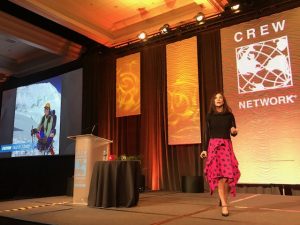 SAN DIEGO—In the opening general session at CREW Network Convention and Marketplace, Wendy Mann, CEO of Crew, began by asking the audience or more than 1,200 if they have ever been ever been asked to take on a job they thought was out of their reach or that demanded skills they didn't have.
SAN DIEGO—In the opening general session at CREW Network Convention and Marketplace, Wendy Mann, CEO of Crew, began by asking the audience or more than 1,200 if they have ever been ever been asked to take on a job they thought was out of their reach or that demanded skills they didn't have.
She shared a story about a New York City bike ride race that she rode with her husband, where the moment she wanted to give up, she pushed forward and ended up finishing the race. She encouraged the audience that the moment they might want to give up, they should look for your biker that might encourage them.
 Mann continued to talk about motivation, obstacles, and overcoming moments where you take on something, make a change, or take on a project that is different or new. “Get on that bike and go. You should always say yes and accept that opportunity. Understand you don't always need to have all the knowledge or skills, you just need to commit. Gear up in your own life and get the skills you need.”
Mann continued to talk about motivation, obstacles, and overcoming moments where you take on something, make a change, or take on a project that is different or new. “Get on that bike and go. You should always say yes and accept that opportunity. Understand you don't always need to have all the knowledge or skills, you just need to commit. Gear up in your own life and get the skills you need.”
 Up next was Alison Levine, team captain of the first American Women's Everest Expedition, who climbed the Seven Summits and skied to the North and South Poles. She said that the principals that apply to the world of extreme adventure also apply to demanding business environments.
Up next was Alison Levine, team captain of the first American Women's Everest Expedition, who climbed the Seven Summits and skied to the North and South Poles. She said that the principals that apply to the world of extreme adventure also apply to demanding business environments.
Levine has survived sub-zero temperatures, hurricane-force winds and sudden avalanches all while also climbing the corporate ladder.
 “There are times in your life where you just have to step up even if you aren't ready,” she said. “Fear is ok. It is just a normal human emotion. Complacency is what will kill you. You have to be able to act and react quickly when in environments that are shifting and changing.”
“There are times in your life where you just have to step up even if you aren't ready,” she said. “Fear is ok. It is just a normal human emotion. Complacency is what will kill you. You have to be able to act and react quickly when in environments that are shifting and changing.”
When you are in a leadership position, even when you feel like absolute hell, you still have to get out there and do your job, she said. “Leadership isn't about title or tenure or how many people report to you. Leadership is about realizing that everybody has a responsibility to look out for looking out for one another.”
 She continued that “You can't leave that responsibility to one person. Everyone has to have a hand in that. As a leader, which we all are, you can never expect the people on your team to endure anything that you aren't willing to endure. It isn't about you, it is about the people around you. You do it for your team.”
She continued that “You can't leave that responsibility to one person. Everyone has to have a hand in that. As a leader, which we all are, you can never expect the people on your team to endure anything that you aren't willing to endure. It isn't about you, it is about the people around you. You do it for your team.”
She talked about storms on Mount Everest and how storms never last forever. The way to get through them is by taking action. “If you want to survive, take action based on the situation, not on the plan. You have to be more focused on executing based on what is going on at that time.”
When talking about her experience in walking away from the peak of Mount Everest when only a couple of hundred feet away due to a storm rolling in, she said that “if the conditions aren't right, you turn around, cut your losses and walk away.” She added that walking away is sometimes harder than pushing forward, but sometimes it is the right decision. You don't have to have absolute clarity…you just have to put one foot in front of the other.”
Give yourself and your teams the freedom to fail, she said. “Nobody gets to the top of the mountain by themselves.”
Stay tuned for more from the CREW convention in the coming days.
© Touchpoint Markets, All Rights Reserved. Request academic re-use from www.copyright.com. All other uses, submit a request to [email protected]. For more inforrmation visit Asset & Logo Licensing.







